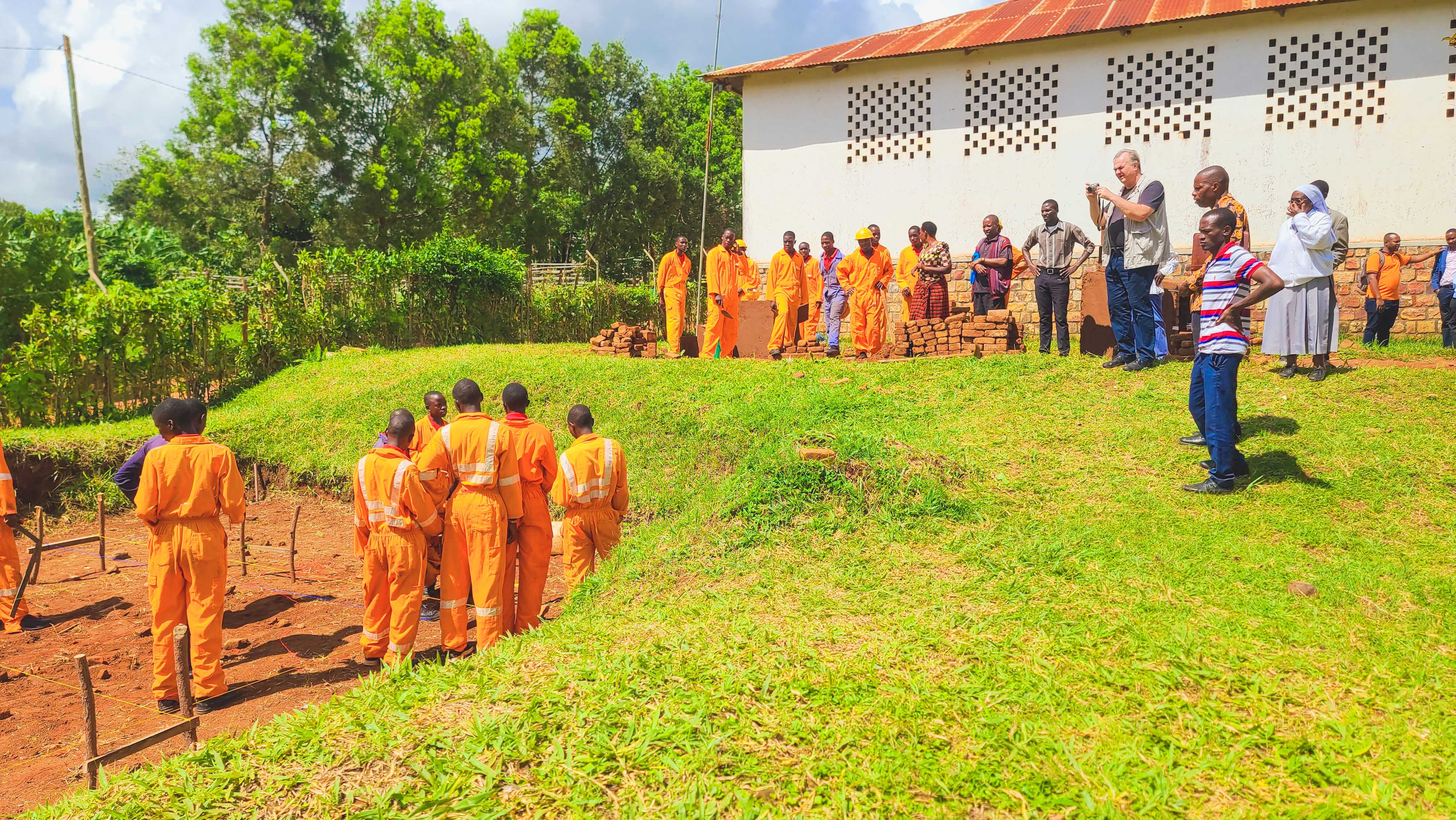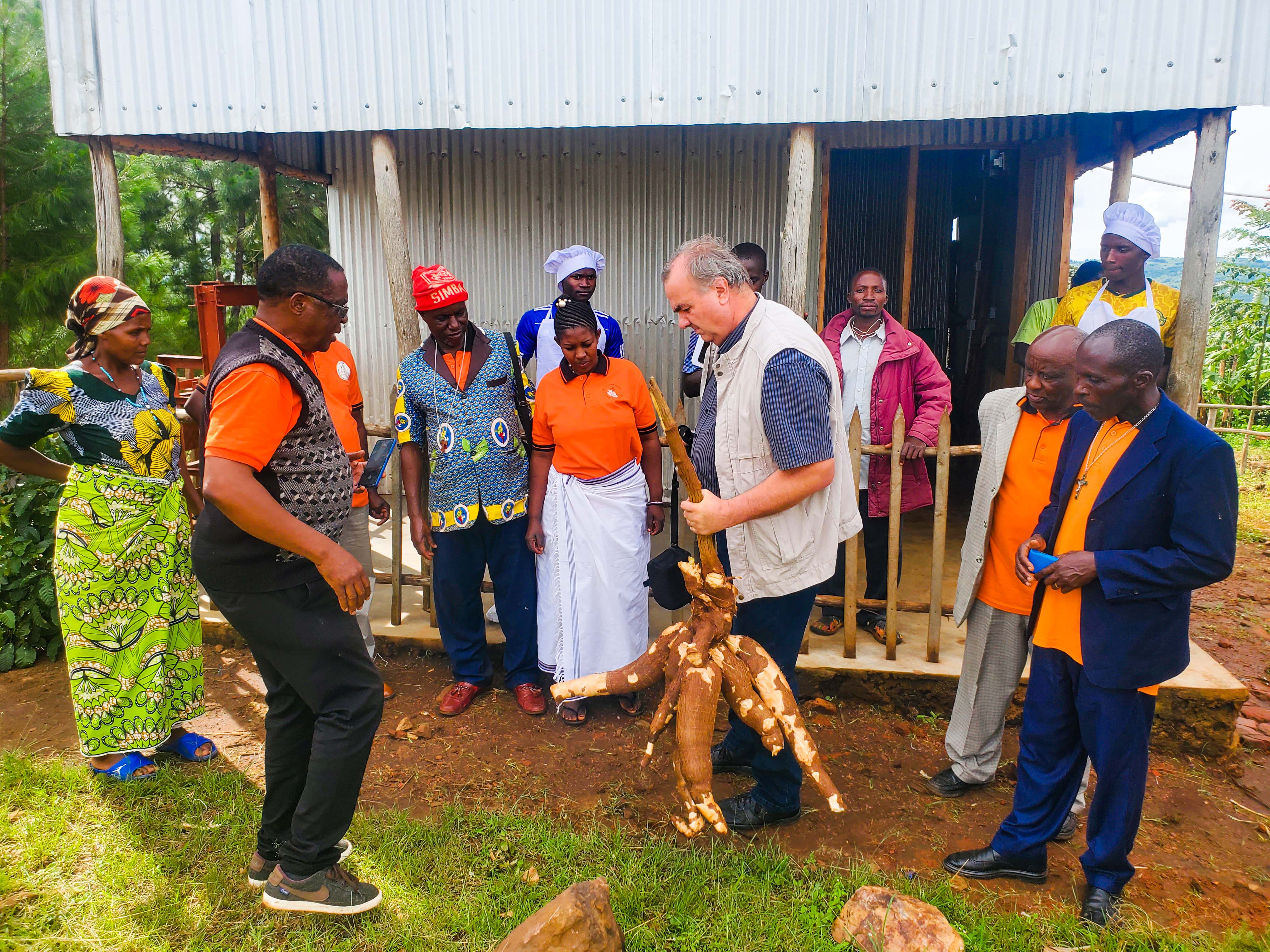The success of Kolping work in
Tanzania is rightly attributed to the strong Kolping spirit,commitment and solidarity among the membership and workers. The efforts to
further spiritual transformation among members of the organization is a prominent
feature generally, and each Local Kolping Family particularly. Guidance and counsel are available
from the Parish Praeses to all the local Kolping Families in the Parish. Kolping Family
meetings are held regularly for praying together and deliberating on social and economic issues.
The Praeses ensures that solutions
to problems are worked out within a framework which is theologically and
morally sound, and that the affairs of each Family or group of Families are
conducted in conformity with the principles of authentic Christianity.
As the Kolping Society is foremost a Catholic Church lay movement it derives
its strength from its spirituality stated as Prayer, Education and Work, concretely reflected in
Marriage and Family, Work and professionalism, social participation and culture and leisure
life situations. The teachings of the Church including social teachings constitute the main
input in induction and ongoing formation at Local Kolping Families, Parish, Diocesan and Kolping
work places.The National Praeses, issues directives and ensures the distribution of Kolping
literature especially Kolping Jana, Leo na Kesho as a
measure to strengthen the spiritual
life in the members and workers alike.
From time to time, seminars, workshops and retreats are held on Biblical,
doctrinal and other spiritual themes to enhance understanding and translating into action the moral
and social teachings of the Church.
The Local Kolping Family meetings
also perform the function of the traditional mutual aid sittings of the African clan. The participants review reported cases of
problems and needs of natural families in their communities and jointly decide on what to do to help
these natural families directly, or to enable them to help themselves. The problems discussed
may be of the spiritual or the material order. Generally, members participate in the life of
the local church,
including taking up leadership roles
at all levels.
KST STAFF FORMATION PROGRAMMEThe spiritual formation programme of the KST for its employees in the National office, Bukoba Kolping Formation Centre (BKFC), Vocational Training Centres and Kolping Schools is aimed at true conversion of the total person and transformation of social realities with the power of the gospel: of the faith that saves, of the hope that enlightens, of the charity that loves.
This is an integral evangelization process leading to maturity in faith, integration of faith and culture, doctrine and life, worship and daily living. The above objectives of the programme are achieved in various degrees through spiritual exercises, works of charity and study sessions, as summarized hereunder:
Spiritual Exercises
1. Eucharistic celebration or Holy Masses are regularly well attended in the Head Office Chapel on
Mondays, Wednesdays and Fridays and on liturgical feast days of particular interest to Kolping Tanzania e.g. 19th March: the Feast of St. Joseph, the Patron of the Kolping Society. At these masses workers benefit greatly from the sermons by the National Praeses or other praesides, that contribute immensely to their spiritual formation and nourishment.
2. Daily morning prayers are recited together in the Chapel followed by Bible reflections and sharing. This exercise is always concluded with a recital of the prayer pleading for the canonization of the Blessed Adolph Kolping.
3. Retreats are observed during the Lenten period and novenas are said in preparations for celebrations of some liturgical feasts. The Lenten messages of TEC are duly studied for practical application to life situations of community members.
4. Workers join their fellow Catholics in making annual pilgrimages to the shrine of Virgin Mary of Lourdes at Mugana Parish and that of St. John Mary Muzeyi, Martyr at Minziro Parish.
5. Workers at the National Office are facilitated regularly to receive the Sacrament of Reconciliation to continue living in the light and grace of God, thanks to the appropriate arrangements by the National Praeses in this regard.
Weekly Study Sessions for Religious formation Kolping employees at all centres have an opportunity for religious formation during weekly study sessions. Main themes of in-depth study are as follows:
1. Christian Family
The formation of Christian families is undoubtedly of the greatest importance. The study sessions, therefore, are aptly deployed to make workers realize, through guided discussions, the Christian meaning of the family, which is not only the basic cell of society, but also a privileged place for living and transmitting the faith. The family should, therefore, hold the pre-eminent place in our evangelization programmes, in order to respond to God’s plan for marriage and to make homes themselves channels for the spread of the Gospel values.
2. The Liturgical Celebration of the EucharistOpportunities for in-depth study of the liturgy of the celebration of the Holy Mass facilitate Kolping employees to discover and better understand the Mass as a sacrifice offered in reparation for sins of humankind and to obtain spiritual and temporal benefits from God.
3. Charitable Works
During the Lenten time, the workers of the KST get to contribute cash towards purchases of food, clothes and shelter materials for needy families.
4. Fruits of the Spiritual transformation programme
While it might not be easy to assess the impact of the spiritual exercises, studies and acts of charity on the spirituality, life and well-being of the workers, nevertheless the following positive signs are noted:
- Genuine effort by many workers at true conversion (metanoia)
-Attendance at Holy Mass has increased
-Receiving of Holy Communion has increased
- Good attendance at the liturgy for the Sacrament of Reconciliation
- Lively discussion and genuine search for the Catholic truth at study session
- Purposeful Bible discussion related to life situation
- A greater involvement in the life of the Church, at levels of Basic Christian
- Communities, Parishes and Diocese.
- A strong family-like spirit among workers.
- More generosity in contributing towards helping the poorest of the poor.







